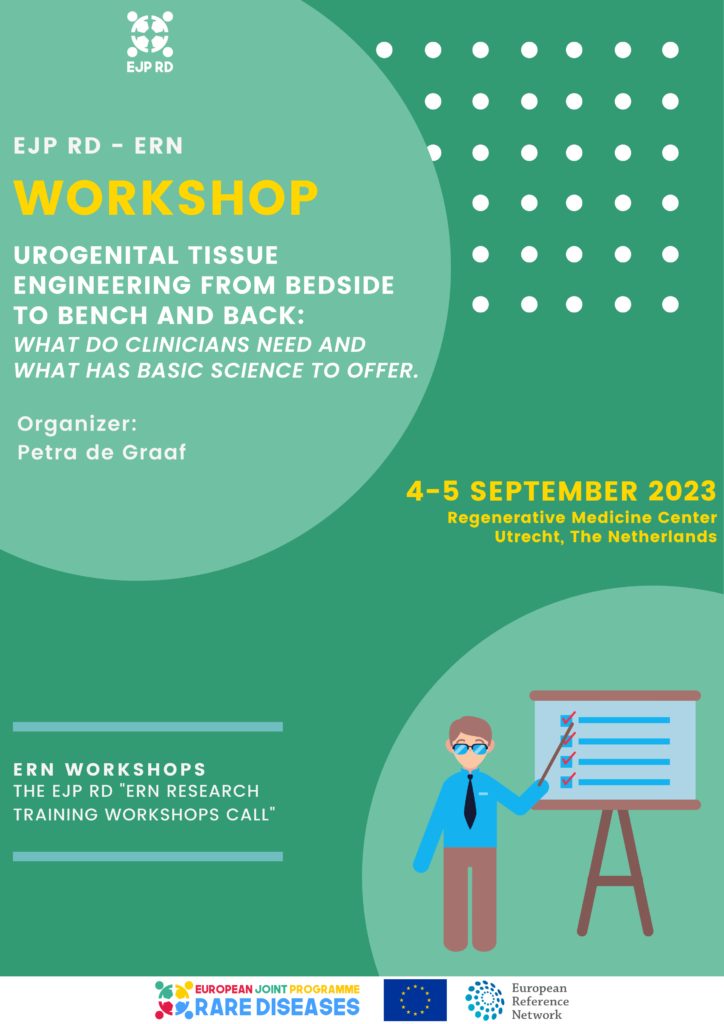- 4 September 2023 - 09:00
- Regenerative Medicine Center Utrecht, The Netherlands


Regenerative Medicine aims to address unmet medical needs by combining our body’s own repair abilities with innovative engineering.
This technology opens new opportunities for use in urogenital disease. Tissue engineering was adopted by the surgical specialties early this century. One of the first lab-grown organs transplanted into humans was an engineered bladder developed in 2006. Unfortunately, despite initial enthusiasm from both urologists and patients, the lab grown bladder failed to significantly improve bladder compliance, capacity, or detrusor pressure in a phase II trial.
A major challenge when considering tissue engineering approaches is understanding key properties of the native tissues. An important example where the biomechanics of the native tissue was largely ignored was the introduction of PolyPropyLene (PPL) meshes when treating Pelvic Organ Prolapse (POP). The meshes can cause severe complications (e.g. acute and chronic infections and tissue erosion) and as such are now banned by the FDA for this application.
These two largely failed attempts to use materials and tissue engineering to treat urogenital disease, left clinicians AND patients with disillusion and an unmet medical need.
Our workshop will acknowledge this setback and look out at new developments and technologies to overcome the disillusion and move forward as there is a clear and urgent need for novel biomaterials and functional meshes. The topic is ideal to bring the different stakeholders (patients, clinicians and basic scientists) and different research communities in complex urogenital diseases together.
The workshop is set up to be inclusive and easily accessible. We mainly target for ERN eUROGEN members, including patient representatives, clinicians and basic scientists. No level of seniority will be necessary. If there are enough spots available, interested patients, scientists, both from clinical and basic background, are invited. We request a small motivation letter in case we have to select. The maximum number of participants is 40.
We will have a combination of interactive sessions and lectures. In the interactive sessions the different backgrounds of the participants will be mixed to get the most out of the box discussions that are normally not achieved within our own communities.
To register please fill the application form here, until 25 August 2023.
The training workshop is free of charge. Travel and hotel expenses will be reimbursed (up to a max of Euro 600) for all selected (max 30) ERN participants. Lunch and dinner will be provided on site for all participants.
Affiliated to an ERN-Full Member or Affiliated Partner institution.
The organizer together with one member of the WP17 Scientific Evaluation Committee will select the most appropriate workshop participants based on motivation letters.
Priority will be given to early career researchers. Registration for the workshop is on a first-come, first-served basis.
At the end of the training workshop a Certificate of Attendance will be sent to the participants who attended the entire workshop and completed the survey. Credits of Continuing Education in Medicine might be issued – to be informed as soon as possible, if there is such a possibility.
English.
Regenerative Medicine Center Utrecht, Hubrecht institute, Uppsalalaan 8, 3584 CT Utrecht, The Netherlands
If you have specific questions, please write to the workshop organizer:
- Petra de Graaf, pgraaf4@umcutrecht.nl
Questions related to organization of travelling hotel, dinner should also be addressed to Petra de Graaf or to stafsecretariaaturologie@umcutrecht.nl
For general inquiries about the workshops in the ERN RD Support and Training Program please write to:
- carola.reinhard@med.uni-tuebingen.de
- c.n.van_beuzekom@lumc.nl
EVENT INFO :
- Start Date:4 September 2023
- Start Time:09:00
- End Date:5 September 2023
- End Time:16:30
- Location:Regenerative Medicine Center Utrecht, The Netherlands

